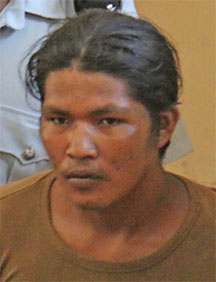Logging company Baishanlin is still in its start-up phase in Guyana and it took big loans to initiate the investment, Opposition Leader David Granger was told during a recent meeting with China’s Ambassador Zhang Limin.
Granger told Stabroek News yesterday that the meeting was not as a result of the recent heightened scrutiny of Chinese companies operating in Guyana, especially Baishanlin, but rather it was to congratulate him on his recent reelection as the PNCR’s leader.
However, he said at the Tuesday’s meeting Baishanlin did come up and he told the Ambassador that the party wanted to see the agreement made with government for the company’s operations and it was at this point it was disclosed that the company, which has been operating in Guyana for about seven years, had taken loans.
“We were concerned that Baishanlin and any other company obey the laws of the country and we would continue to exercise scrutiny through the National Assembly and through investigation of the agreement to make sure that they are in Guyana’s national interest,” Granger said.
Asked about the context in which the Ambassador would have disclosed that the company had taken large loans, Granger said he explained that the Ambassador, as the local representative for China here, had a duty to ensure that Chinese companies conduct themselves in a lawful manner and he had to be aware of the circumstances under which the companies come to Guyana and the environment in which they operate. “He insisted that he has emphasised the social responsibilities of companies in this country to the companies… he has said to them that they had a social responsibility to the people of Guyana,” Granger said, while adding that he was very heartened to hear this. “That is why he raised the matter [of the loans], he wanted to assure me that Baishanlin, in particular, was in a phase of development and in that phase his interpretation was that they are still doing foundation work but we insisted that whatever they are doing must be done in the context of the law,” he added.
When pressed for further details on the meeting, which came at a critical time, and whether specific issues, such as the company’s many promises in its start-up phase, some of which have not been met, Granger noted that it was not “an argument” about what the company was doing and whether it was doing things right or wrong. Rather, he said he made it clear to the Ambassador that the party has an obligation to the people of Guyana and to the National Assembly to scrutinise the work of that company and all other companies.
Granger said they also spoke briefly about China Harbour Engineering Company (CHEC), the contractor for the Cheddi Jagan International Airport, Timehri expansion project, the Marriott Hotel project and the Amaila Falls Hydropower project.
“It wasn’t sort of an investigation of a particular company, it was more or less a broad policy discussion on the role of the opposition, particularly since the opposition has the majority to vote in the National Assembly.”
According to Granger, they assured the Ambassador that Guyana is prepared to welcome foreign investment as long it is done within the context of the country’s laws.
He said that it was indicated that there should be a flow of information as the parliamentary opposition has the majority and a right to know what was happening in terms of the commercial relations between any country and Guyana. He also signalled the opposition’s intentions to conduct diligent scrutiny of any foreign investment, while noting that it was its duty to the people of Guyana and in the national interest.
He said too the PNCR also expressed the hope that there would be positive technology transfer and that the industries would not be purely extractive but that Guyanese would be given employment on good terms and that there should be some progress in terms of value-added production.
Granger was asked if the Ambassador raised whether the Chinese community had expressed any concerns following the heightened press coverage of companies owned by Chinese but he said there was no such discussion. He noted that the Ambassador did, however, raise the question of general elections. “He asked whether the onset of elections would lead to any public security situation. So, I said that was a matter for the executive not a matter for the opposition. I assured him the opposition had no interest in disorder,” he noted.
Granger explained that the PNCR has longstanding relations with the communist party of China and that he was congratulated by the party on him being returned as the leader of his party. At the time of the PNCR elections the Ambassador was out of the county and on his return he requested to meet him to reiterate what was in the letter of congratulation sent to him.
Their discussion also included the way the relationship between the two countries has changed over the years and how the kind of technology provided by China about 40 years ago, such as the textile mill and claybrick factory, has evolved. “We do have a background of very friendly relations between the two parties and between the two countries… so much of the time was taken up with sort of the reiteration of the kind of friendly relations we would have had,” Granger said.






